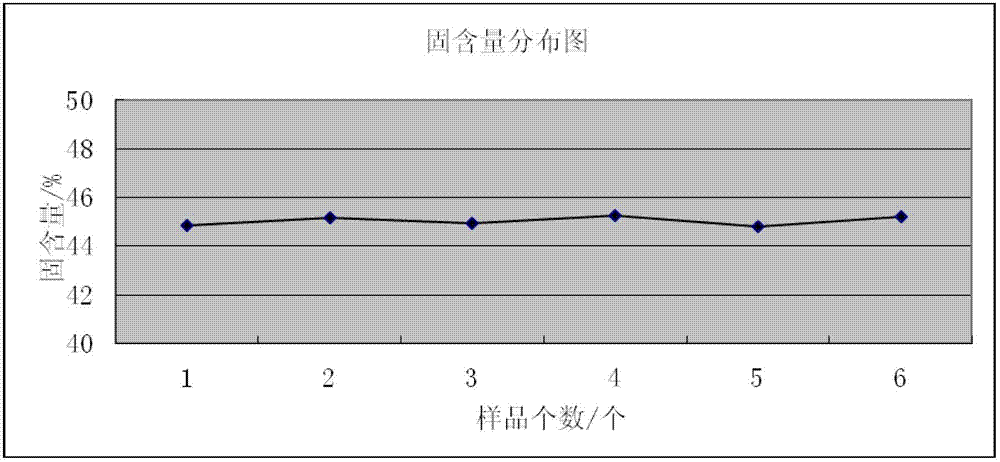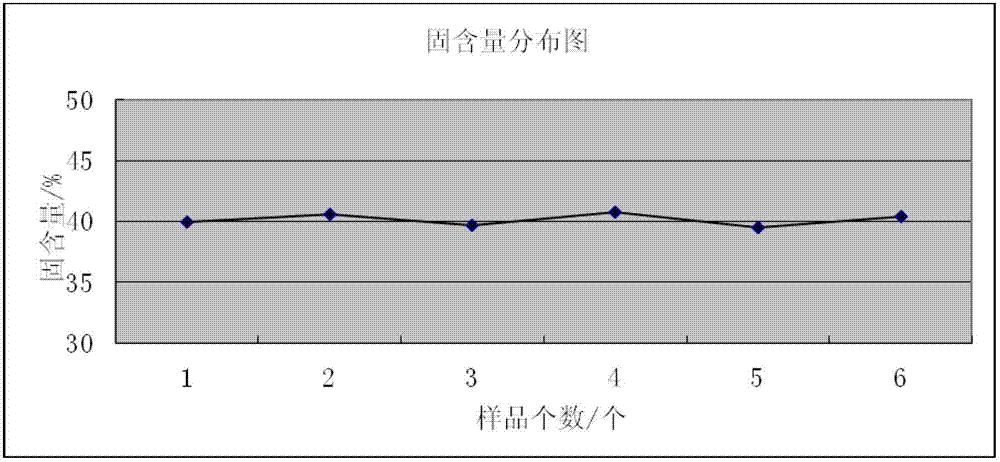Method for assessing settleability and uniformity of lithium ion battery anode slurry
A technology for lithium-ion batteries and positive electrode materials, applied in the direction of analyzing materials, weighing by removing certain components, instruments, etc., can solve problems such as inconsistent internal resistance of batteries, unevenness, and large differences in physical properties
- Summary
- Abstract
- Description
- Claims
- Application Information
AI Technical Summary
Problems solved by technology
Method used
Image
Examples
Embodiment 1
[0035] The components of lithium iron phosphate slurry, a positive electrode material for lithium ion batteries, are shown in Table 1, and the theoretical solid content is 42.00%.
[0036] Table 1 Lithium Iron Phosphate Slurry Components of Lithium-ion Battery Cathode Material
[0037] Element
conductive agent
binder
Proportion (%)
35.00
3.00
4.00
58.00
[0038] A method for evaluating the sedimentation and uniformity of the positive electrode material lithium iron phosphate slurry for lithium ion batteries, comprising the following steps:
[0039] (1) Take the lithium iron phosphate slurry, which is the positive electrode material of lithium-ion batteries, and stir it evenly. Take 3 samples randomly from different positions in the slurry tank, namely A, B, and C. Mark the samples and perform centrifugation at a speed of 2000rmp , the centrifugation time is 30min;
[0040] (2) Divide...
Embodiment 2
[0052] The components of lithium iron phosphate slurry, a positive electrode material for lithium ion batteries, are shown in Table 3, and the theoretical solid content is 45.00%.
[0053] Table 3 Lithium Iron Phosphate Slurry Components of Lithium-ion Battery Cathode Material
[0054] Element
conductive agent
binder
Proportion (%)
38.00
3.00
4.00
55.00
[0055] A method for evaluating the sedimentation and uniformity of the positive electrode material lithium iron phosphate slurry for lithium ion batteries, comprising the following steps:
[0056] (1) Take the lithium iron phosphate slurry, which is the positive electrode material of lithium-ion batteries, and stir it evenly. Take 3 samples randomly from different positions in the slurry tank, namely A, B, and C. Mark the samples and perform centrifugation at a speed of 3000rmp , the centrifugation time is 10min;
[0057] (2) Divi...
Embodiment 3
[0070] The composition of lithium iron phosphate slurry, a cathode material for lithium ion batteries, is shown in Table 5, and its theoretical solid content is 40.00%.
[0071] Table 5 Lithium Iron Phosphate Slurry Components of Lithium-ion Battery Cathode Material
[0072] Element
conductive agent
binder
Proportion (%)
33.00
3.00
4.00
60.00
[0073] A method for evaluating the sedimentation and uniformity of the positive electrode material lithium iron phosphate slurry for lithium ion batteries, comprising the following steps:
[0074] (1) Take the lithium iron phosphate slurry, which is the positive electrode material of lithium-ion batteries, and stir it evenly. Take 3 samples randomly from different positions in the slurry tank, namely A, B, and C. Mark the samples and perform centrifugation at a speed of 1000rmp , the centrifugation time is 30min;
[0075] (2) Divide the thre...
PUM
 Login to View More
Login to View More Abstract
Description
Claims
Application Information
 Login to View More
Login to View More - R&D
- Intellectual Property
- Life Sciences
- Materials
- Tech Scout
- Unparalleled Data Quality
- Higher Quality Content
- 60% Fewer Hallucinations
Browse by: Latest US Patents, China's latest patents, Technical Efficacy Thesaurus, Application Domain, Technology Topic, Popular Technical Reports.
© 2025 PatSnap. All rights reserved.Legal|Privacy policy|Modern Slavery Act Transparency Statement|Sitemap|About US| Contact US: help@patsnap.com



